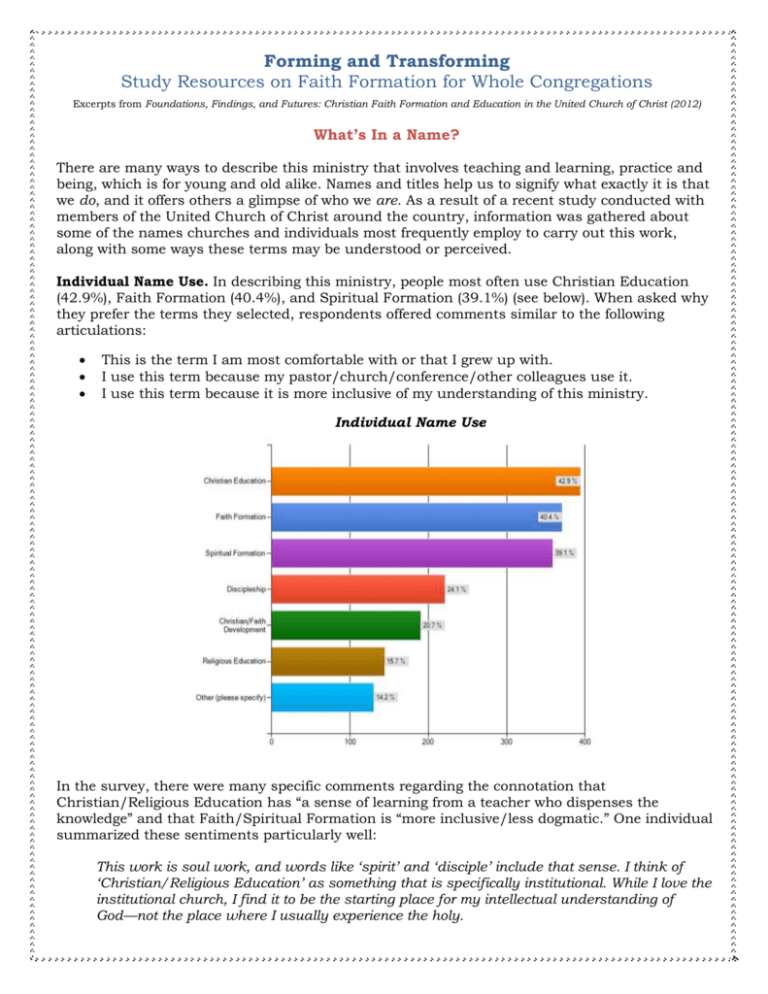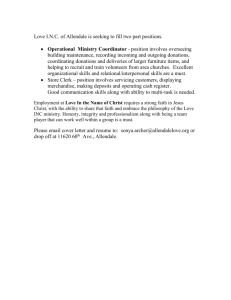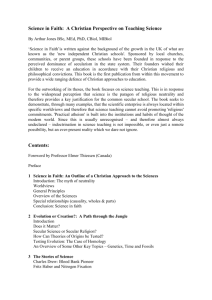Forming and Transforming Study Resources on Faith Formation for
advertisement

Forming and Transforming Study Resources on Faith Formation for Whole Congregations Excerpts from Foundations, Findings, and Futures: Christian Faith Formation and Education in the United Church of Christ (2012) What’s In a Name? There are many ways to describe this ministry that involves teaching and learning, practice and being, which is for young and old alike. Names and titles help us to signify what exactly it is that we do, and it offers others a glimpse of who we are. As a result of a recent study conducted with members of the United Church of Christ around the country, information was gathered about some of the names churches and individuals most frequently employ to carry out this work, along with some ways these terms may be understood or perceived. Individual Name Use. In describing this ministry, people most often use Christian Education (42.9%), Faith Formation (40.4%), and Spiritual Formation (39.1%) (see below). When asked why they prefer the terms they selected, respondents offered comments similar to the following articulations: This is the term I am most comfortable with or that I grew up with. I use this term because my pastor/church/conference/other colleagues use it. I use this term because it is more inclusive of my understanding of this ministry. Individual Name Use In the survey, there were many specific comments regarding the connotation that Christian/Religious Education has “a sense of learning from a teacher who dispenses the knowledge” and that Faith/Spiritual Formation is “more inclusive/less dogmatic.” One individual summarized these sentiments particularly well: This work is soul work, and words like ‘spirit’ and ‘disciple’ include that sense. I think of ‘Christian/Religious Education’ as something that is specifically institutional. While I love the institutional church, I find it to be the starting place for my intellectual understanding of God—not the place where I usually experience the holy. Several others discussed the notion that each term possesses different meanings, and they subsequently utilize them depending on context. One person eloquently stated the comments of many: I think there are nuances to each term, and each is appropriate to a slightly different context...To me, Christian Education is specifically educating people (of all ages) about our faith, and Religious Education implies a broader context that may include learning about other faiths, or may be used when talking in a multi-faith environment about education. Faith Formation includes education, but includes many more experiences than classes—worship participation and intergenerational activities help form faith. To me, Spiritual Formation is very similar, but may focus on practicing various spiritual disciplines (prayer, meditation, etc.). Congregational Name Use. Overwhelmingly, congregations utilize the vocabulary of Christian Education to describe this ministry (66.9%). Only one in four congregations (24.4%) use the term Faith Formation. Congregational Name Use Other terms people mentioned in the survey included such names as: Sunday School; Church School; and Children, Youth, and Family Ministries. Some of these terms were described as subsets of the three more frequent names highlighted above; but they are also important to name since many churches use these descriptors. Based on this survey and other research, a beginning framework for understanding the relationship between these three most frequently used terms was created. Christian Faith Formation Spiritual Education Formation Head--------------/-----------------------------------/-------------------------------------/----------------Heart This framework helps to summarize what was discovered and, as a result, offer some basic statements: Christian Education is understood and perceived as having to do with traditional classroom models of teaching and learning for the purpose of gaining “head” knowledge. Spiritual Formation is understood and perceived as having to do with practices of devotion and a focus on the inner work of the soul for the purpose of attaining “heart” wisdom. Faith Formation is understood and perceived as an engaged process of learning and practice integrated throughout all aspects of congregational and daily life. This definition allows for the combining of “head” and “heart” knowledge into a more holistic understanding and embodiment, rather than creating a dichotomy between these two areas. Because of these findings, there is now an intentional effort to utilize the name Faith Formation in the national setting of the United Church of Christ in order to describe and share resources for more holistic and vital ministry. Questions for Reflection What is/are the name(s) your church uses to describe this ministry? What name(s) do you personally use when talking with others about this work? How are they similar to or different than one another? How would you define the terms Christian Education, Spiritual Formation, and Faith Formation? How would your congregation define these terms? What similarities and differences do you notice between these understandings and perceptions? Does your church have a single definition or mission statement to give direction/shape to this work? If so, does it accurately reflect the ministry that is currently taking place? If not, what might you include in such a definition/statement? Reflect on the definition of Faith Formation provided (“an engaged process of learning and practice integrated throughout all aspects of congregational and daily life”). What do you appreciate about this definition? What is missing from this definition that would be important for your own context? Take a look at the framework diagram offered above. How might you edit, adapt, or build on this model to create a more expansive and inclusive framework for this ministry? For example, where might the “hands” fit into this “head” and “heart” model? Or, how can the framework more accurately reflect the transformation movement of the Holy? Produced by Local Church Ministries








